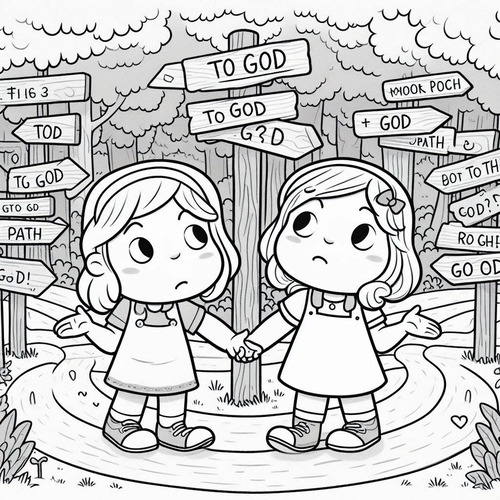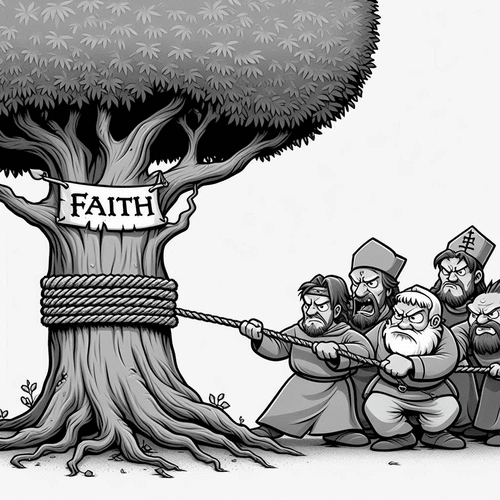Christianity and Rational Inquiry: Responding to Challenges
Christianity and Rational Inquiry: Integrating Faith and Reason
Overview: Christianity has faced scrutiny from atheists and rationalists, particularly since the Enlightenment in the 18th century, for what they argue is lack of empirical evidence to support its supernatural claims. Critics view Christian beliefs in miracles, a literal biblical creation account, and the possibility of divine intervention as contradictory to a modern scientific worldview.
Christianity and Rational Inquiry: The Real Question To Ask The ultimate question rationalists should be asking is not for empirical proof for miracles. Rather, they should be asking, “Does a transcendent, sovereign God exist?” For, if such an all-powerful God is found to be philosophically and rationally coherent, the possibility of His supernatural intervention in the natural order—through miracles—logically follows. The rationalist objection gets the inquiry backwards. It should first pursue whether a God exists. If an all-powerful God exists, it logically follows He would perform miracles that astonish human reason. Dismissing miracles solely because they defy our contemporary scientific models errantly places limited human reasoning above the prospect of an unlimited God.
The Role of Empiricism and its Limits The scientific method has been an indispensable tool for learning about the physical world through observable, testable, and repeatable experimentation. However, empiricism cannot claim to be the exclusive path to knowledge. Many things in life—such as ethics, metaphysics, logic, and human experiences cannot be scrutinized solely through the scientific process. Christianity acknowledges both material and immaterial realms.
Historical Evidence for the Supernatural While miracles such as the resurrection do defy natural laws, they don’t contradict reason. Jesus’s empty tomb, appearance to more than 500 eye witnesses, and the dramatic life transformation of His earliest followers provide historical testimonies to the resurrection’s plausibility. Just as past singular events such as the universe’s origin cannot be replicated scientifically, and yet cannot be dismissed as impossible to accept, so it is reasonable to accept well-evidenced supernatural events as possible.
The Reasonableness of Theology Christian theology is a comprehensive framework for understanding reality. It is internally coherent and can be evaluated through rigorous philosophical analysis. The central Christian doctrines are grounded in logical principles such as the law of non-contradiction, make persuasive use of arguments, and uphold human reason as a faculty reflecting the divine Logos. Thinkers like Aquinas, Anselm and Augustine have demonstrated theological beliefs that are rationally compelling.
Science and Creation The Christian view has no essential conflict with mainstream science. It aligns with science in saying the natural world operates in an understandable pattern governed by laws. It also agrees that humanity is uniquely distinct from other species. Where Christianity differs is in explaining the source behind this ordered complexity—it stems from the creativity of a powerful God who purposely fashioned the cosmos. So Christians can fully embrace mainstream science regarding how the natural world works, while believing God is ultimately behind the order and mechanisms science describes.
Christianity and Rational Inquiry: Integrating Faith and Reason While secular philosophies may dismiss religious truth claims, Christianity has long affirmed faith and reason as complementary sources of knowledge. Empirical investigation describes the world’s mechanics while scriptural revelation illuminates the transcendent meaning and purpose behind creation. Christian theism provides the philosophical foundations for rational inquiry, objective truth and the intelligible universe modern science presupposes. Faith properly understood incorporates empirical evidence and grounds itself in coherent, defensible beliefs about the cosmos.
Despite persistent rationalist objections, Christianity stands as an intellectually robust worldview harmonizing spiritual truth and philosophical reasonableness. Far from rejecting empirical evidence or science, it thoughtfully integrates them within a larger, evidence-supported framework of meaning. The perceived conflict between faith and rationality proves illusory when both are rightly understood and synthesized.
References: McGrath, A. (2016). Mere Apologetics: How to Help Seekers and Sceptics Find Faith. Baker Books.: Keller, T. (2008). The Reason for God: Belief in an Age of Scepticism. Penguin Books.: Wright, N.T. (2003). The Resurrection of the Son of God. Fortress Press.: Plantinga, A. (2011). Where the Conflict Really Lies: Science, Religion, and Naturalism. Oxford University Press.: Collins, F. (2006). The Language of God: A Scientist Presents Evidence for Belief. Free Press.
Editor's Pick

Why Do People Hate the Doctrine of Election?
…WHEN THEY REALLY SHOULDN’T Few Bible doctrines provoke stronger reactions than election. The idea that God chose some for salvation [...]

The Doctrine of Providence: Does God Really Govern All Things?
You’re sitting in the doctor’s office when the diagnosis lands like a thunderclap. Your mind races: Why this? Why now? [...]

No Decay, No Defeat: What It Means That Christ’s Body Saw No Corruption
On the Day of Pentecost, Peter stood before thousands and made a startling claim: David's body decayed in the tomb, [...]
SUPPORT US:
Feel the Holy Spirit's gentle nudge to partner with us?
Donate Online:
Account Name: TRUTHS TO DIE FOR FOUNDATION
Account Number: 10243565459
Bank IFSC: IDFB0043391
Bank Name: IDFC FIRST BANK






